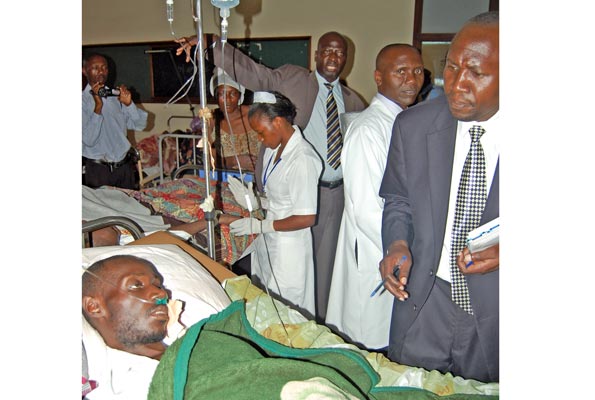Analysis by Paul Abusharizi
Nalongo’s son had just undergone an operation and it was long past the time he was supposed to get his final pain killer for the day. She looked on helplessly as he whimpered in pain as his father went in search of the doctor on duty.
The nurse on duty, when she came around three hours after the 6:00pm prescribed time for the young man’s doze, claimed the drugs were not in stock and that they should go outside the hospital to buy the drugs, which prescription she hastily scribbled on a piece of paper.
As it turns out the drug was very much in stock. For those in the know this was a subtle attempt by the nurse to extract some money from the parents of the in-pain boy.
All this happened at the national referral hospital — Mulago. While the end user is under the impression that our health centres are suffering a perennial drug shortage, National Medical Stores is sitting on tons of drugs which are reportedly in short supply.
“My warehouses are full of drugs to the point that I am asking my suppliers to hold with future deliveries as I try to work these ones out of the system,” NMS boss Moses Kamabare told Sunday Vision.
Clearly, between NMS warehouses and the end users, there is a bottle neck that is preventing the end users from accessing lifesaving drugs.
Three years ago in an attempt to alleviate the perennial drug shortages in public facilities, government centralised the procurement process under NMS.
Previously, the procurement of drugs was decentralised to the national referral hospitals ‑Mulago and Butabika, the regional referral hospitals and the districts, which supplied the health center II to IV.
By centralizing drug procurement government hoped to take advantage of the discounts possible with the ensuing economies of scale, create uniformity of supply and curb drug thefts.
Under the current system the referral hospitals and the districts provide NMS with a procurement plan, which guides NMS as to the drugs and their quantities to buy for the year as well as how regularly they should be disbursed. NMS only procures according to these plans.NMS has a delivery schedule which is monthly for Mulago and Butabika and once every two months for everybody else.
Since the capacity to quantify needs was lacking at the lower health centres the health ministry came up with a basic kit, which has most of the essential drugs and supplies like gloves, which are supplied to the health centres two and three.
So NMS clients are supposed to requisition their drugs according to their pre-determined procurement plans and only then will they be supplied with the drugs.
“That is where the problem starts. We quickly found out that either they do not requisition, so we don’t dispatch or they requisition less than they already planned for leaving us with unused stock,” Kamabare said.
That is where the discrepancy between shortages at the health centres against the contradiction of NMS’ full warehouses begins.
By not requisitioning or under requisitioning you have health centres without drugs for months or running out of supplies ahead if schedule respectively.
Why this happens is a mixed bag of motives that range from incomprehensible incompetence to sabotage of an innovation that would expose the old practitioners to individual abuse of the system to meet personal needs.
“For example some prescribers can prescribe medicines that are not on our national essential medicines list. The idea being the patient would have to go out of the hospital to order the drugs living the impression that the hospital is short on drugs while the truth is that a perfectly adequate drug is readily available in the health facility’s dispensary,” Kamabare said.
Clearly a holistic solution to the problem including increasing health workers pay and welfare and training many more health workers is required.
But as a start beyond the streamlining procurement Kamabare counsels the use of medicines only listed in the national Essential Medicines List and prescribe as stipulated in the Uganda Clinical Guidelines – which has detailed descriptions of common ailments in the country and how they should be prescribed for.
“Artificial scarcities are being created and sustained contrary to the truth, “ the NMS boss says. “Among the drugs we are over laden with are those for cancer, TB, ARVs, family planning supplies, rabies vaccines, insulin and mama kits.
My concern is not that my warehouses are full but what is happening to the rightful patients of these drugs …. Aren’t they dying because of a failure of our systems?”
https://www.cehurd.org/2012/05/do-we-really-h…-drug-shortage


